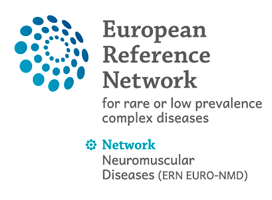 Orla Hardiman
Orla HardimanThe Irish Neuromuscular Consortium provides integrated care , with weekly clinics providing on site specialist physicians, specialist health care professionals (physiotherapy, occupational therapy, speech and language therapy, dietetics, counselling, neuropsychology, respiratory evaluation andmfunctional assessment.) Specialist representatives from the voluntary sector are integrated members of the team. Diagnostic evaluation in each clinic includes appropriate genetic testing, muscle biopsy, muscle MRI, electrodiagnostics (nerve conduction studies and EMG). Information sheet are available with details about each condition and useful numbers including emergency numbers for out of hours care. A nurse led phone service is available at all sites during office hours, and 24/7 support through the hospital switchboard. Patients are followed with in-clinic functional assessments and home visits (ALS) . Function is evaluated by the therapists and all patients have on site access to orthotics, splinting, manual wheelchair and powermobility chair etc. . In addition, patient receive proactive evaluation respiratory and cardiac evaluation where appropriate. On site regular pulmonary function tests, and TOSCA monitoring are undertaken in clinic. All patients receive cough assist device and non-invasive nocturnal ventilation through anticipatory care (home based initiation in ALS/MND) . Patients are evaluated for orthopaedic interventions including tendinotomy and spinal surgery (pediatrics only) through multidisciplinary assessment and pre-anaestheic evaluation. All pPatients have access to acute in-hspital care care during times of acute respiratory decompensation. Intergrated Clinical Care Pathways for Neuromuscular Disorders have been generated as part of Model of Care, to improve access to health and social care services The paediatric clinic runs a national treatment program for intrathecal Nusinersen for children with Spinal Muscular Atrophy, and the adult ALS clinic participates in both pharma led and investigator led studies. All ALS patients (comprising 80% of the national population) are reviewed within the Multidisciplinary Clinic at 4-6- week intervals, with an “open door” policy for those requiring urgent attention.Specialist nurses work as part of the team to undertake regular home visits and integrate care between the hospital and community services. Respiratory management, including use of insufflation/exsufflation devices and initiation and management of non-invasive ventilation (NIV) is undertaken at home across the entire country by three hospital funded senior Clinical Nurse Specialists. This specialist nurse-led service also provides an opportunity to discuss end-of-life issues in a home setting, advice on advance care directives and incorporates educational sessions for community, hospital and hospice staff. The ALS /MND services has embedded research into clinical practice and has implemented practice guidelines as part of an ongoing quality improvement cycle. Clinical intervention and outcome data are regularly reviewed and are subject to ongoing evaluation (e.g. stakeholder choice experiments, audit reviews etc.). The service also undertakes regular self-audits of nursing and clinical professional activities, and quality of life measurement is embedded into the services. Examples of applied research and audit undertaken by staff within the ALS /MND clinic include: • Longitudinal respiratory assessment to evaluate the predictive value of FVC, SVC, Peak Cough Flow and Sniff Nasal Inspiratory Pressure (SNIP) • Evaluation of the beneficial effects of clinic-based shoulder injection by physiotherapists for adhesive capsulitis in MND • Evaluation of the beneficial use of cough assist in managing secretions • Evaluation of beneficial effects of psychological intervention for caregiver burden • Comparison of breath stacking versus cough assist in management of secretions • Introduction and evaluation of the beneficial effects of voice banking • Effects of dysphagia and gastrostomy feeding on quality of life in ALS/MND The ALS/MND Clinic at the National Centre is closely linked with the Academic Unit of Neurology at Trinity College Dublin, which houses the Irish ALS/MND Research group (www.mnd.ie). The Research group is responsible for the ALS/MND Register and DNA bank. The ALS/MND Register is population based, has been in operation since 1995, and has full case ascertainment, with details from over 2500 patients . The Academic Unit of Neurology at Trinity College Dublin is linked to the ALS/MND service, and is led by the ALS/MD Clinic Director (Hardiman) The Unit has 6 main patient-oriented work streams, including epidemiology and deep phenotyping, biomarker development (imaging and neuroelectric signal analysis), genomics, outcome measures, health services research and clinical trials. Detailed genetic epidemiologic studies of ALS in Ireland have provided information about the rates of familial ALS within the Irish population, and have provided information about the frequency of known mutations within the population. This work has been performed in a research setting, and has demonstrated that C9orf72 repeat expansions account for approximately 10% of all ALS cases in Ireland, and accounts for 50% of known familial ALS. The remaining “known genes” (SOD1, TDP43 and FUS) are rare in the Irish population. The ALS/MND clinical and research group is leading a series of large European consortia that assess and evaluate the patient journey in ALS/MND, and that determine the use of various respiratory based measurements that increase the accuracy of outcome prediction and interventions (e.g. insufflation/exsufflation machines “cough assist” that reduce intercurrent infections and enhance quality of life). The ALS/MND Centre is a preferred site for ALS/MND clinical trials, with a dedicated Clinical Trial Coordinator, a Staff nurse a data manager and 2 Fellows. The ALS/MND services has supported over 20PhDs and 5 MSc, and is currently support 7 additional PhDs.

